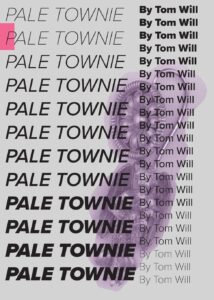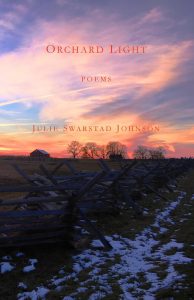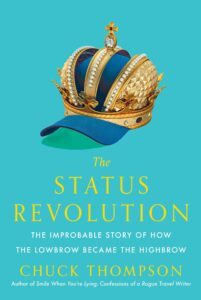Poetry. 46 pgs. Apocalypse Confidential. July 2023. 9798987366219.
Why would someone take the end rhymes of poem-within-novel “Pale Fire” and repopulate its heroic couplets with an entire new book of poetry? This is a question anyone might ask themselves about Pale Townie, second print offering from web magazine Apocalypse Confidential, before deciding to pre-order it. Tom Will assures us “the why was lost” somewhere in the effusive final months of 2022 putting these four cantos together, but the end product lives up to its origins.
Heroic Couplets have been popular about as long as there has been English poetry you and I could recognize. The style of these Couplets is characterized by translation, used in several famous cases to make Ancient Greek poetry recognizably Heroic to vulgar audiences. They have equally vulgar origins in Chaucer: the first English author to be recognizably funny, but only English enough that he has to be read in translation. These Couplets wouldn’t be what they are without poets of the 1700s putting on airs, but they weren’t initially so irony-free. Since about 1300 the average content of heroic couplets has ranged from mythic to ridiculous and never one or the other for long.
Death is traditionally heroic. Every hero eventually dies, and many practice for death before their life ends. Canto One opens with an invocation of the “muse of the weekend” to “sing … the death of [her] favorite son.” The townie’s journey is a descent and reemergence from the underworld begging for Joseph Campbell stratification. But the townie retrieves nothing, learns nothing or little, and strikes no bargain with a literal deific Death. He “refused to kill [himself] so the snow / Murdered” him, crashing his car into a lake, managing to surface, and telling us how. What follows is a song that banishes the suicide of gradual neglect. Between a million references and plenty of invention, in registers of elegy and forgery, the townie tells us why he has thus far lived, did not always want to, but ought to forever.
He asks in Canto One “if what’s on this cracker’s for / Eating” and the answer is implicit. As a pale reviewer, I must offer Pale Townie my seal of approval—as far as safety for consumption—where paleness is concerned. The townie hails from someplace snowy, enjoys “all liquors” and French film, literature, and ballads, Frank Stanford, but does not like Dickinson. The townie laments how “the world stopped caring about my taste / Buds” which is probably true but a little pathetic to mention. He often follows a true statement, like “lines are light / And shadow,” with a false one, like “black landlords vote white.” Beyond his meandering dishonesty, the townie often lapses into nested, knitted metaphors that alternately alienate and grip the reader:
… I swing
Like my glasses in pity taking wing
Married my shoulder blades as that’s where there’s
Rooms for wings of all sorts; guitars or chairs
Or birds or moths or of ropeswings instead
Of any angel’s cloths; all visited
Me and ministered to my mockingbird
Heart; and somehow the mockingbirds had heard
Of me my pitiable wings;
He is erudite and highfalutin although quick to temper the Romance with a self-effacing joke. In this instance, midway through Canto One, the metaphor-chain from ‘flying glasses’ to ‘religious rapture’ back to ‘pitying birds’ occurs a few lines after a veiled reference to masturbation. Tone is inconsistent, all peaks and troughs, the content is encyclopedic, but the Heroic voice steadily projects the “film in [his] head” in all its melodrama. Given the conceit and your own sensibilities, you may not find this melodrama warranted or credible as I did.
The townie is All-American. If he had even one self-conscious flaw, some notion of his own mortality, any deficit in personality, he could plaster over his empty parts referencing this or that, cribbing character notes from speakers of poems and other leading roles. But the townie has no emptiness problem because all of his consumption – literature, film, alcohol – is integral, he’s entirely full, not papering-over but load-bearing, gone hydraulic. And if he’s going to speak for his resurrection, we’ll need all the references in order to capture its magnitude. The townie exists self-consciously within a tradition—Dante, Pope’s Homer—and leaves clues about his context and subversive intentions as the non-hero of these couplets. Still, even once we track down every name, unpack every metaphor, exhaust every lead: “… if the poem and / The townie can be explained than I’ll head / Uphill to write a new one; or I’m dead.” It’s a matter of life and death to the townie that his performance is removed and distant and surprising, but also rewarding to repeat viewings. A sufficiently deep and winding poem is a way to live forever, or at least defer death in being memorable.
In fairness to readers of reviews who become book buyers, and especially to Tom Will, I admit to papering over many load-bearing themes of the book. This especially includes love and loss – of the beloved, not one’s own life. I’ve barely managed to touch on the religion and only paid lip service to all the sex, synthesized more than once but notably in the run, “Priests wrote down all your sins … so sinner dance / The lowliest angel knows your cock’s each stance.” Thematic treatment is crude or else delicate in appropriate measure, at one point gushing “thank you / Pages thank you life thank you book.” Will introduces this book as “talking with several poets” he was otherwise “grateful to merely listen to.” He has succeeded in producing something uniquely conversational, capturing the savant-doofus sermonizing of the white guy from Noplace, Here & Now, who you can walk out your door into any gas station to find and coax him into saying a line that wouldn’t be out of place in Pale Townie if you spruced it up a bit. You may not hail from anyplace snowy or know anybody like this, but for all the obsessive detail Will doesn’t seem to be after particularity. The conversation about love, sex, death, faith, etc., has been ongoing for at least 600 years, not only in English, or in Europe, and usually not even through heroic couplets.
But this is the language Will has adopted—kidnapped, really, from Nabokov, and held for ransom, paying for itself handsomely—to insert himself in this conversation and make a very compelling case to listen to him. It’s anybody’s guess whether Will might someday provide a commentary and index that turns Pale Townie into “Pale Townie,” book-within-book. While the work is a clear and singing initiation for a poet who now knows what he wants to say and how to say it—having broken through the other side of a frozen lake, another swim may be uncalled for. For my money, I doubt the townie will be abandoned, and his voice will be audible in Will’s future work if only in echo.
Pale Townie is available through Apocalypse Confidential. Purchase it now through their website.
Like what you’re reading?
Get new stories or poetry sent to your inbox. Drop your email below to start >>>
NEW book release
Ghosts Caught on Film by Barrett Bowlin. Order the book of which Dan Chaon calls “a thrilling first collection that marks a beginning for a major talent.”
GET THE BOOK



